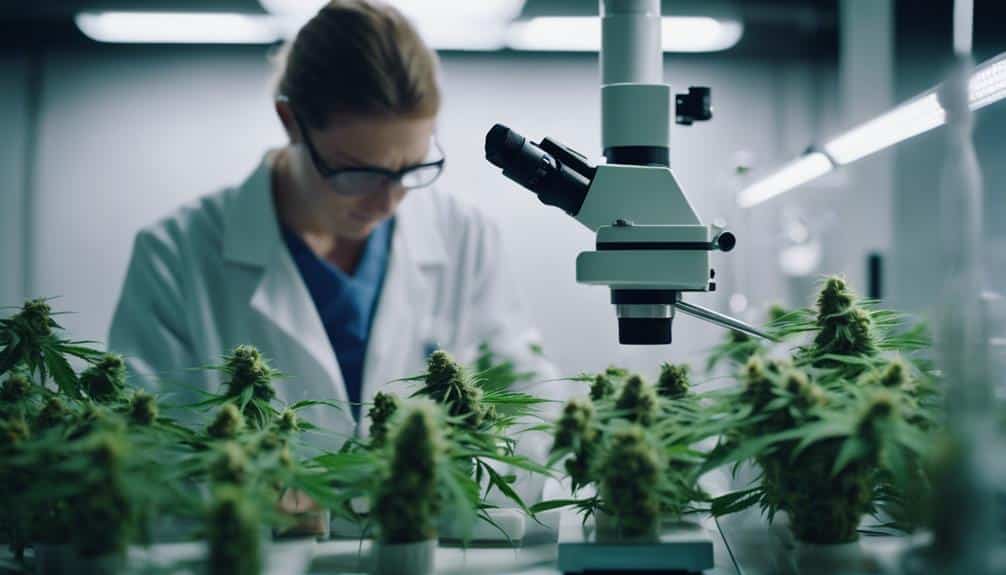Imagine walking into a doctor’s office and, instead of receiving a prescription for a synthetic drug, you’re recommended a natural plant: cannabis. You’re part of an evolving global trend where healthcare is shifting, with cannabis playing an increasingly significant role.
From managing chronic pain to treating mental health conditions, the applications appear endless. But how exactly is this green revolution transforming the healthcare landscape? This journey is just beginning, and you’re invited to join the discourse as we explore the shifting paradigms and the potential future of cannabis in healthcare.
The Historical Stigma of Cannabis

To understand the changing role of cannabis in healthcare, it’s essential first to delve into the historical stigma attached to this plant. Rooted in societal norms and religious perspectives, this stigma paints an image of cannabis as taboo rather than a potential health aid.
Social connotations have significantly shaped public opinion. Initially, cannabis was associated with criminal activities and counterculture, leading many to view its consumers as deviants. This negative perception was further reinforced by media portrayals creating a cycle of prejudice and misunderstanding.
Religious perspectives also contributed to stigmatization. Certain faiths deemed using intoxicants like cannabis sinful, thus influencing their followers’ attitudes towards it. This religious stigma paired with societal disapproval created potent bias against cannabis.
However, this narrative overlooks the plant’s medicinal properties and potential benefits. The stigma didn’t consider the relief cannabis could offer to patients suffering from chronic pain, epilepsy, or other conditions. As healthcare providers, it’s crucial for you to challenge these outdated perceptions and advocate for a balanced understanding of cannabis based on scientific evidence rather than prejudice. This shift in mindset is vital for integrating cannabis into healthcare responsibly and effectively.
Cannabis Legalization and Acceptance
With the wave of cannabis legalization sweeping across numerous countries, it’s becoming increasingly important to understand its acceptance in society and implications for healthcare. You might be curious about the impact of legalization and how it alters public perception.
- Legalization Impact: It’s not just about making cannabis accessible. It’s about creating a regulated, safe market that minimizes risks and maximizes therapeutic benefits. Countries that have legalized cannabis have seen a decrease in drug-related crimes and an increase in tax revenue.
- Public Perception: Legalization often leads to a shift in public perception. Once viewed as a dangerous drug, many now see cannabis as a valuable medical resource.
- Acceptance in Healthcare: Medical professionals are gradually accepting cannabis as a viable treatment option. Continued research and patient success stories are driving this change.
- Global Acceptance: This acceptance isn’t limited to just a few countries. From Canada to Uruguay, nations worldwide are embracing the potential of cannabis.
Understanding these aspects will help you better serve those impacted by these changes. Remember, it’s not just about legalization; it’s about acceptance and understanding the role of cannabis in society and healthcare.
Cannabis in Modern Medicine

Building on the increasing acceptance of cannabis in healthcare, let’s consider its role in modern medicine and how it’s reshaping treatment paradigms. Understanding Cannabis Genealogy plays a crucial role here. It’s the study of different cannabis strains and their genetic variations, allowing for more targeted, effective treatments.
The exploration and development of Therapeutic Strains have become a pivotal part of this process. Specific strains show promise in treating a range of conditions, from chronic pain to mental health disorders. The potential for personalized treatment plans focusing on an individual’s needs and reactions is opening up new avenues in patient care.
Yet, it’s important to remember that while the benefits are promising, there are also potential risks. Long-term effects are still under research, and the lack of regulation can lead to inconsistencies in product quality.
Case Studies: Cannabis Treatment Successes
Numerous case studies bear testament to the success of cannabis treatment in diverse medical scenarios demonstrating its potential to revolutionize healthcare. Patient experiences vary but there are common threads of relief, improvement, and sometimes complete turnaround of conditions.
Let’s consider four cases that illustrate the therapeutic potentials of cannabis:
- Chronic Pain: A 45-year-old woman with fibromyalgia experienced significant pain reduction after integrating cannabis into her treatment routine.
- Epilepsy: An eight-year-old child suffering from severe epilepsy unresponsive to traditional treatments found her seizure frequency drastically reduced with CBD oil.
- Cancer: A 60-year-old lung cancer patient reported that cannabis oil helped mitigate the side effects of chemotherapy and improved his quality of life.
- PTSD: A veteran struggling with PTSD found solace in cannabis, which helped him manage anxiety and sleep disorders better than prescribed medications.
These cases illustrate the potential of cannabis as a viable treatment option in healthcare. However, it’s important to remember that individual responses may vary, and consulting healthcare professionals is essential before incorporating cannabis into any treatment plan. This is just the beginning of understanding the full extent of cannabis’s therapeutic potential.
Future Projections for Cannabis in Healthcare

As we peer into the future of healthcare, it’s clear that cannabis could play a significant role in transforming treatment methods and patient outcomes. Cannabis biotechnology is rapidly evolving, and with it, a surge in therapeutic applications is anticipated.
You might see an increase in the development of cannabis-derived pharmaceuticals tailored to specific conditions enhancing precision in therapy. Biotech firms are already experimenting with genetic modifications of the cannabis plant aiming to improve its therapeutic efficacy and safety profile. The future may witness a new generation of cannabis-based drugs which could revolutionize areas like pain management, mental health, and neurological disorders.
Moreover, as acceptance grows you’ll likely see more insurance companies covering cannabis-based treatments. It could also lead to startups specializing in cannabis healthcare solutions fostering innovation in the sector.
Nonetheless, regulatory advancements must keep pace. Ensuring the safe and ethical use of cannabis in healthcare will be paramount. As you serve others in this evolving landscape, staying informed and adaptable is key. The green revolution in healthcare is just beginning, and cannabis could be at its forefront.
Conclusion
You’ve seen it; the green revolution is unfolding before your eyes. Cannabis, once stigmatized, is now recognized as a powerful tool in healthcare. Its success stories are mounting, and its future in medicine looks promising. So isn’t it time we shed old biases and embrace this transformative leaf? The green revolution isn’t just changing healthcare; it’s revolutionizing it.
We warmly invite you to visit us at Cannabis Docs of Delaware to learn more about how this green revolution can benefit you. You’ll be welcomed into a friendly, informative environment where our team is ready to answer your questions and guide you on this journey. Or if you prefer, just give us a call – we’re always here to help. Don’t just watch the revolution unfold; be a part of it.
The post The Green Revolution: How Cannabis Is Changing Healthcare appeared first on Delaware Cannabis Docs.
source https://delawarecannabisdocs.com/the-green-revolution-how-cannabis-is-changing-healthcare/

No comments:
Post a Comment